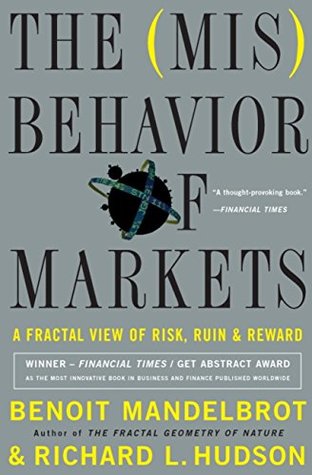More on this book
Community
Kindle Notes & Highlights
Read between
August 24 - September 6, 2018
I hope readers of this book, whether they agree or disagree with everything I say, will forsake, at least for a moment, the practical details of why. Instead, I hope they emerge from the book’s pages with a greater fundamental understanding of how financial markets work, and of the great risk we run when we abandon our money to the winds of fortune.
The old financial orthodoxy was founded on two critical assumptions in Bachelier’s key model: Price changes are statistically independent, and they are normally distributed. The facts, as I vehemently argued in the 1960s and many economists now acknowledge, show otherwise. First, price changes are not independent of each other. Research over the past few decades, by me and then by others, shows that many financial price series have a “memory,” of sorts. Today does, in fact, influence tomorrow.
And then there is the most confounding factor of all, anticipation. A stock price rises not because of good news from the company, but because the brightening outlook for the stock means investors anticipate it will rise further, and so they buy. Anticipation is a feature unique to economics. It is psychology, individual and mass—even harder to fathom than the paradoxes of quantum mechanics. Anticipation is the stuff of dreams and vapors.
Sure, after the fact, with enough time and effort, we can piece together a tolerable cause-and-effect story of why a price moved the way it did. But who cares? It is too late by then. Fortunes have been gained and lost. Before the fact, in the real world of fast markets, veiled motives, and uncertain outcomes, probability is the only tool at our disposal.
Mild randomness, then, is like the solid phase of matter: low energies, stable structures, well-defined volume. It stays where you put it. Wild randomness is like the gaseous phase of matter: high energies, no structure, no volume. No telling what it can do, where it will go. Slow randomness is intermediate between the others, the liquid state.
if you have special insights into a stock, you could profit from being the first in the market to act on it. But you cannot be sure you are right or first; after all, the market is full of people at least as smart as you. So, in sum, it may not be worth your while to spend all that time and money getting the information in the first place. Cheaper and safer to ride with the market. Buy a stock index fund. Relax. Be passive. Or as Samuelson at MIT put it: “They also serve who only sit and hold.”
In other words, they lost their shirts. But they did not care. The fact that their formula had correctly spotted the anomalous warrants suggested that their math was sound, even if their market intelligence was not. So in October 1970, Black and Scholes submitted a paper to the Journal of Political Economy. Rejection: Too specialized, the journal said.
An economist makes assumptions about how markets work, how businesses operate, how people make financial decisions. Any one of these assumptions, considered alone, is absurd. There is a rich vein of jokes about economists and their assumptions. Take the old one about the engineer, the physicist, and the economist. They find themselves shipwrecked on a desert island with nothing to eat but a sealed can of beans. How to get at them? The engineer proposes breaking the can open with a rock. The physicist suggests heating the can in the sun, until it bursts. The economist’s approach: “First, assume
...more
And floods—natural or man-made—need defenses. Machiavelli once saw fortune as a flood, and his metaphor is apt here.
Fama edited my text and wrote an introduction for it. This was a helpful translation, for economists, of what I was trying to tell them as a mathematician. I have since found translators helpful when selling new ideas in a hostile marketplace.
Let us mull the promises that science makes to society to win its support. The grand promise is to endeavor solving the great mysteries—to the list of which I have added one. But there is also a more practical promise. It consists in helping society to improve, to prevent it from acting on the basis of theories that sound nice but are not true to the facts, and to help it act on the basis of facts—even if those facts have yet to find a theory that fully explains them.
You cannot beat the market, says the standard market doctrine. Granted. But you can sidestep its worst punches.
In the end, he says, his goal is to make the financial system work better and more safely. If the real market worked like FXTrade, costs would come down, liquidity would rise. “The world economy is like your body,” he says. “Your heart pumps six liters of blood a minute, and so if you weigh eighty kilos it would take about fifteen minutes to pump your body’s weight. By that analogy, the world foreign exchange market should be transacting $40 trillion every ten minutes. Today we do $1 trillion or so in twenty-four hours. My claim is the global economy is close to a heart attack.”
Such pragmatism is needed in financial theory. It is the Hippocratic Oath to “do no harm.” In finance, I believe the conventional models and their more recent “fixes” violate that oath. They are not merely wrong; they are dangerously wrong. They are like a shipbuilder who assumes that gales are rare and hurricanes myth; so he builds his vessel for speed, capacity, and comfort—giving little thought to stability and strength. To launch such a ship across the ocean in typhoon season is to do serious harm. Like the weather, markets are turbulent. We must learn to recognize that, and better cope.


